
The Cricket World Cup is the international championship of One Day International (ODI) cricket. The event is organised by the sport's governing body, the International Cricket Council (ICC), every four years, with preliminary qualification rounds leading up to a finals tournament. The tournament is one of the world's most viewed sporting events and is considered the "flagship event of the international cricket calendar" by the ICC.
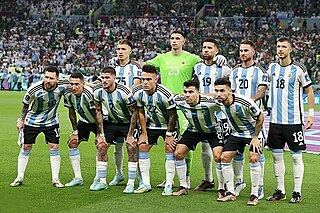
The FIFA World Cup, often simply called the World Cup, is an international association football competition contested by the senior men's national teams of the members of the Fédération Internationale de Football Association (FIFA), the sport's global governing body. The tournament has been held every four years since the inaugural tournament in 1930, except in 1942 and 1946 when it was not held because of the Second World War. The reigning champions are Argentina, who won their third title at the 2022 tournament.
Grandmaster (GM) is a title awarded to chess players by the world chess organization FIDE. Apart from World Champion, Grandmaster is the highest title a chess player can attain. Once achieved, the title is held for life, though exceptionally it has been revoked for cheating.

The Rugby World Cup is a men's rugby union tournament contested every four years between the top international teams. The tournament is administered by World Rugby, the sport's international governing body. The winners are awarded the Webb Ellis Cup, named after William Webb Ellis, who according to a popular legend, invented rugby by picking up the ball during a football game.

The Six Nations Championship is an annual international men's rugby union competition between the teams of England, France, Ireland, Italy, Scotland and Wales. The current champions are France, who won the 2022 tournament.

The UEFA Champions League is an annual club football competition organised by the Union of European Football Associations (UEFA) and contested by top-division European clubs, deciding the competition winners through a round robin group stage to qualify for a double-legged knockout format, and a single leg final. It is one of the most prestigious football tournaments in the world and the most prestigious club competition in European football, played by the national league champions of their national associations.

The Australian Open is a tennis tournament held annually at Melbourne Park in Melbourne, Victoria, Australia. The tournament is the first of the four Grand Slam tennis events held each year, preceding the French Open, Wimbledon, and the US Open. The Australian Open starts in the middle of January and continues for two weeks coinciding with the Australia Day holiday. It features men's and women's singles; men's, women's, and mixed doubles; junior's championships; and wheelchair, legends, and exhibition events. Before 1988, it was played on grass courts, but since then two types of hardcourt surfaces have been used: green-coloured Rebound Ace up to 2007 and blue Plexicushion since 2008.
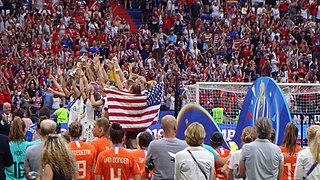
The FIFA Women's World Cup is an international association football competition contested by the senior women's national teams of the members of Fédération Internationale de Football Association (FIFA), the sport's international governing body. The competition has been held every four years and one year after the men's FIFA World Cup since 1991, when the inaugural tournament, then called the FIFA Women's World Championship, was held in China. Under the tournament's current format, national teams vie for 31 slots in a three-year qualification phase. The host nation's team is automatically entered as the 32nd slot. The tournament, called the World Cup Finals, is contested at venues within the host nation(s) over a period of about one month.

The UEFA European Football Championship, less formally the European Championship and informally the Euro, is the primary association football tournament organised by the Union of European Football Associations (UEFA). The competition is contested by UEFA members' senior men's national teams, determining the continental champion of Europe. It is the second-most watched football tournament in the world after the FIFA World Cup. The Euro 2012 final was watched by a global audience of around 300 million. The competition has been held every four years since 1960, except for 2020, when it was postponed until 2021 due to the COVID-19 pandemic in Europe, but kept the name Euro 2020. Scheduled to be in the even-numbered year between FIFA World Cup tournaments, it was originally called the European Nations' Cup, changing to the current name in 1968. Since 1996, the individual events have been branded as "UEFA Euro [year]".
The Copa América or CONMEBOL Copa América, known until 1975 as the South American Football Championship, is the top men's football tournament contested among national teams from South America. It is the oldest still-running continental football competition, as well as the third most watched in the world. The competition determines the champions of South America. Since the 1990s, teams from North America and Asia have also been invited to compete.

The NCAA Division I men's basketball tournament, branded as NCAA March Madness and commonly called March Madness, is a single-elimination tournament played each spring in the United States, currently featuring 68 college basketball teams from the Division I level of the National Collegiate Athletic Association (NCAA), to determine the national championship. The tournament was created in 1939 by the National Association of Basketball Coaches, and was the idea of Ohio State coach Harold Olsen. Played mostly during March, it has become one of the most popular annual sporting events in the United States.
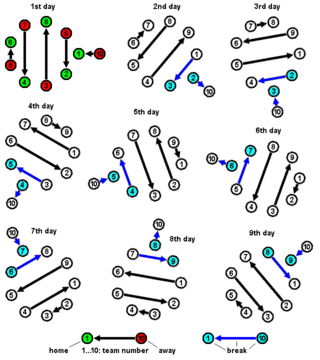
A round-robin tournament is a competition in which each contestant meets every other participant, usually in turn. A round-robin contrasts with an elimination tournament, in which participants/teams are eliminated after a certain number of losses.

The FIFA U-20 World Cup is the biennial football world championship tournament for FIFA members’ men's national teams with players under the age of 20. The competition has been staged every two years since the inaugural tournament in 1977 when it was hosted by Tunisia, under the tournament name of FIFA World Youth Championship until 2005. In 2007 the name was changed to its present form. The current title holder is Ukraine which won its first title at the 2019 tournament in Poland.
The FIFA Club World Cup is an international men's association football competition organised by the Fédération Internationale de Football Association (FIFA), the sport's global governing body. The competition was first contested in 2000 as the FIFA Club World Championship. It was not held from 2001 to 2004 due to a combination of factors in the cancelled 2001 tournament, most importantly the collapse of FIFA's marketing partner International Sport and Leisure (ISL), but since 2005 it has been held every year, and has been hosted by Brazil, Japan, the United Arab Emirates, Morocco and Qatar. Views differ as to the cup's prestige: it struggles to attract interest in most of Europe, and is the object of heated debate in South America.
The ICC Women's Cricket World Cup is the sport's oldest world championship, with the first tournament held in England in 1973. Matches are played as One Day Internationals (ODIs) over 50 overs per team, while there is also another championship for Twenty20 International cricket, the ICC Women's T20 World Cup.
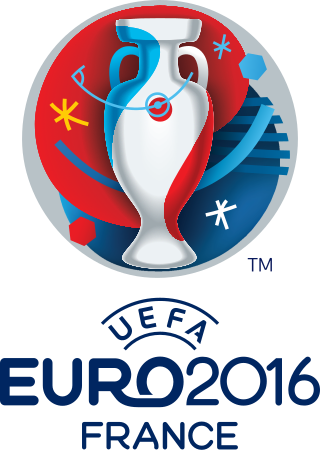
The 2016 UEFA European Football Championship, commonly referred to as UEFA Euro 2016 or simply Euro 2016, was the 15th UEFA European Championship, the quadrennial international men's football championship of Europe organised by UEFA. It was held in France from 10 June to 10 July 2016. Spain were the two-time defending champions, having won the 2008 and 2012 tournaments, but were eliminated in the round of 16 by Italy. Portugal won the tournament for the first time, following a 1–0 victory after extra time over the host team, France, in the final played at the Stade de France.

The ICC Men's T20 World Cup is the international championship of Twenty20. Organised by cricket's governing body, the International Cricket Council (ICC), the tournament consists of 20 teams, with top 12 teams from the previous tournament getting automatic qualifications. while the 8 other teams chosen through the Regional Qualifiers
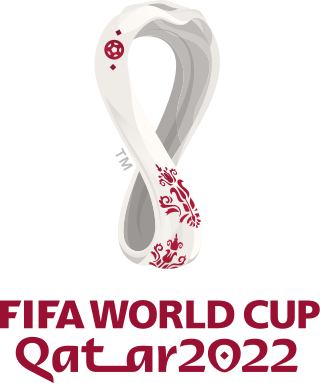
The 2022 FIFA World Cup was an international football tournament contested by the men's national teams of FIFA's member associations and 22nd edition of the FIFA World Cup. It took place in Qatar from 20 November to 18 December 2022, making it the first World Cup held in the Arab world and Muslim world, and the second held entirely in Asia after the 2002 tournament in South Korea and Japan.

The Bangladesh Premier League (BPL) (Bengali: বাংলাদেশ প্রিমিয়ার লিগ) is a professional Twenty20 cricket league organized by BPL Governing Council . The BPL is one of the three professional cricket leagues in Bangladesh. It is the 16th most attended premier league in the world. In winter, each team faces the other twice in the league stage. Following the conclusion of the regular season, the top four teams advance to the playoffs, a single-elimination game, and two qualifier games culminating in the Championship game, between the winner of Qualifier 1 and Qualifier 2.
The ICC Women's T20 World Cup is the biennial international championship for women's Twenty20 International cricket. The event is organised by the sport's governing body, the International Cricket Council (ICC), with the first edition having been held in England in 2009. For the first three tournaments, there were eight participants, but this number has been raised to ten from the 2014 edition onwards. In July 2022, the ICC announced that the Bangladesh would host the 2024 tournament and that England would host the 2026 tournament. The number of teams in at the 2026 tournament is also set to increase to twelve.














